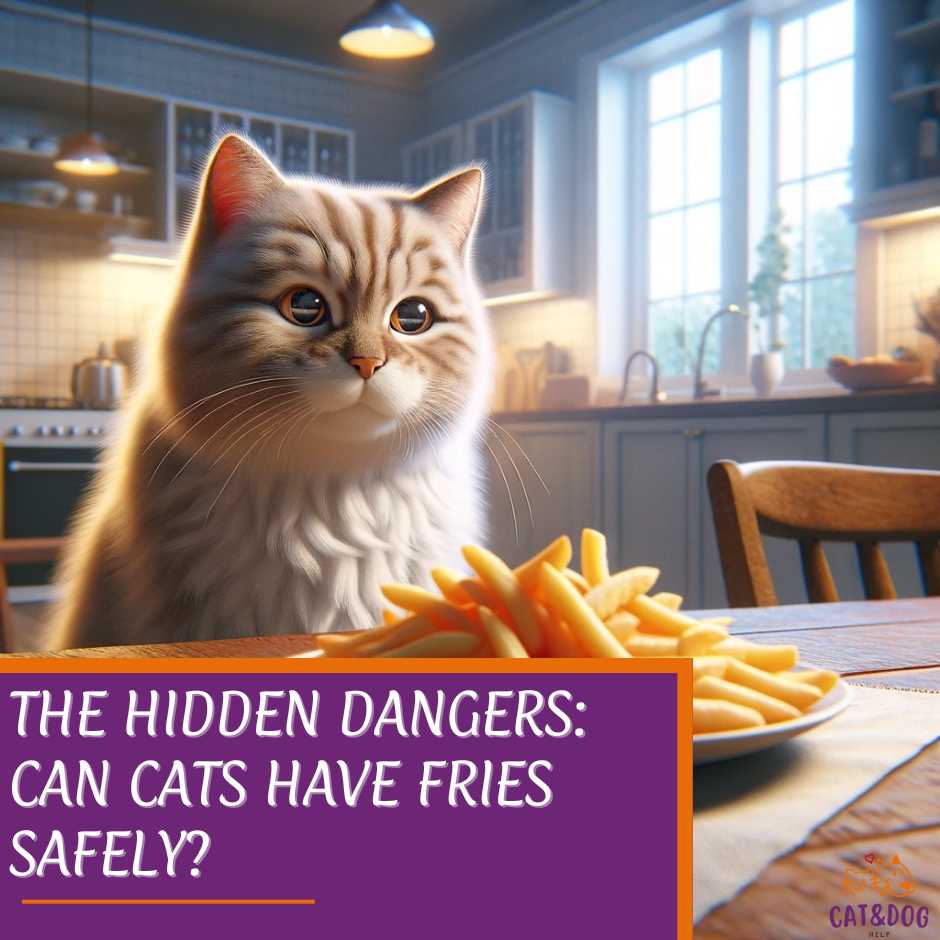Have you ever sat on your couch, enjoying some crispy French fries, and noticed your cat eyeing them with curiosity?
As a cat owner, you might wonder if sharing a bite with your feline friend would be a harmless treat. It’s vital to consider the unique dietary requirements of cats before letting them indulge in human foods.
Unlike humans, cats are obligate carnivores, which means that they require animal protein, not cat food, to thrive.
Their bodies are engineered to process meat, not the high carbs found in foods like French fries.
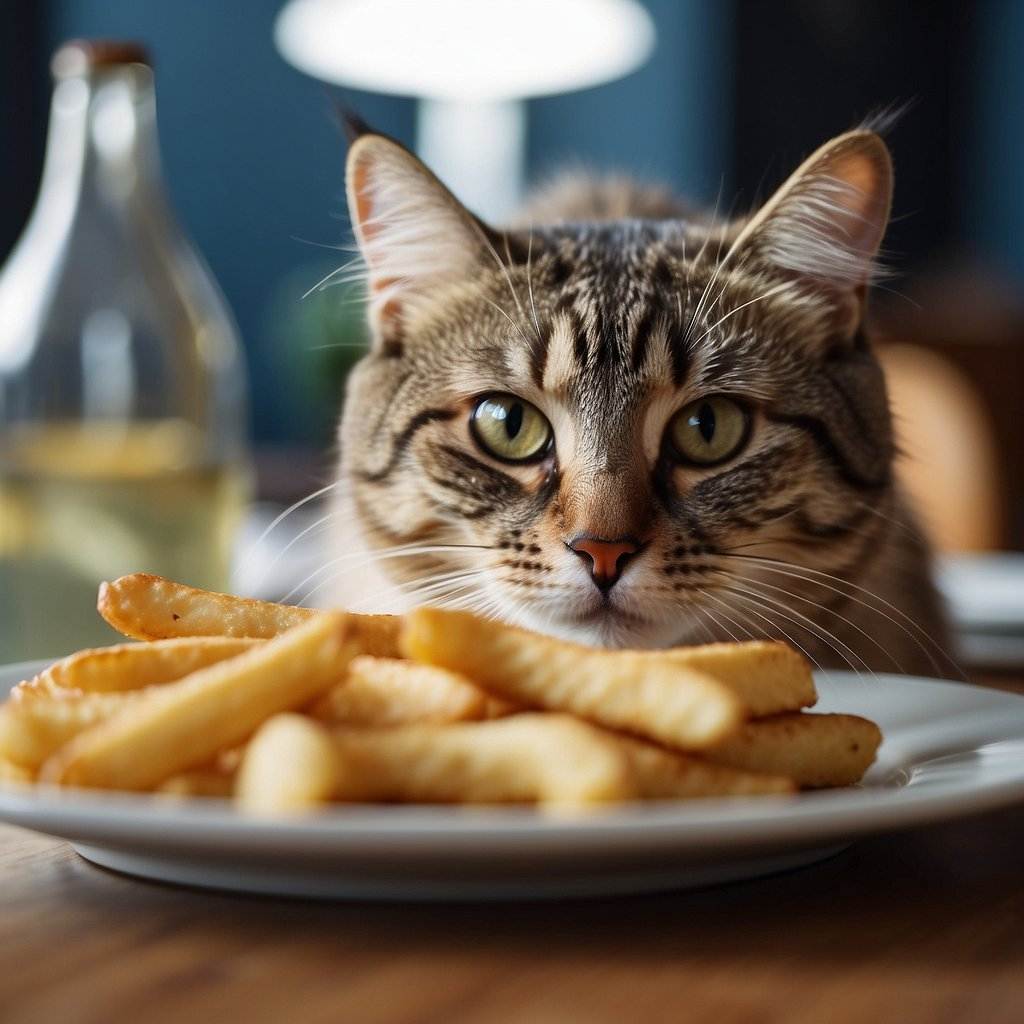
The occasional table scrap might seem benign, but the reality is that cats have specific nutritional needs that differ from humans.
French fries carry no essential nutrients that benefit a cat’s diet.
By nature, these tasty treats are high in sodium and fats, which can lead to health issues such as dehydration, kidney problems, joint problems, or obesity in cats. (1)
Plus, the seasoning and oils on French fries are not suitable for your cat’s digestive system, which can lead to stomach upset or more severe complications related to joint problems. (2)
Key Takeaways
- Cats are obligate carnivores that require animal protein and certain nutrients that French fries do not provide. (3)
- French fries contain high levels of fats and sodium, which are harmful to cats and may lead to health issues. (4)
- Human food, in general, is not recommended for cats due to their specific dietary requirements and potential health risks.
Can Cats Have Fries? Comprehensive Analysis
Ever wondered if those golden, crispy fries could be a cheeky treat for your cat? Let’s take a bite into the reality of feline nutrition versus those tempting morsels.
Nutritional Concerns with French Fries for Cats Imagine you’re eating a fry, savoring that salty tang and the crunchiness.
Now, think about your feline friend. Cats require a specific diet, high in protein and low in carbohydrates. Let’s crunch some numbers:
- Salt: A sprinkle of flavor for you can be a mountain of sodium for your cat. Too much salt leads to feline salt toxicity, dehydration and other health issues. (5)
- Fats: Those fries are soaked in unhealthy fats, something cats don’t need on their plate. High-fat intake can quickly lead to obesity. (6)
Here’s a no-fries zone breakdown:
| Harmful Ingredient | Effect on Cats |
| High Salt | Dehydration, sodium ion poisoning |
| Unhealthy Fats | Obesity, digestion troubles |
Behavioral Insights: Why Cats are Attracted to Fries Have you noticed your cat sniffing around your fries?
They’re not after the potato; it’s the intriguing smell and the texture they’re curious about. Your cat’s nose knows! It’s drawn to those greasy, salty scents.
But hold up! You can turn this curiosity into playtime. Engage your cat with a toy instead of a fry, and steer their attention to something beneficial for their hunting instincts.
So, as much as your cat might paw with longing at your plate, remember, you’re not depriving them. You’re keeping them healthy and spry.
Save the fries for your movie nights and give your kitty something they’ll not only love but will keep them in tip-top shape.
Safe Alternatives and Solutions
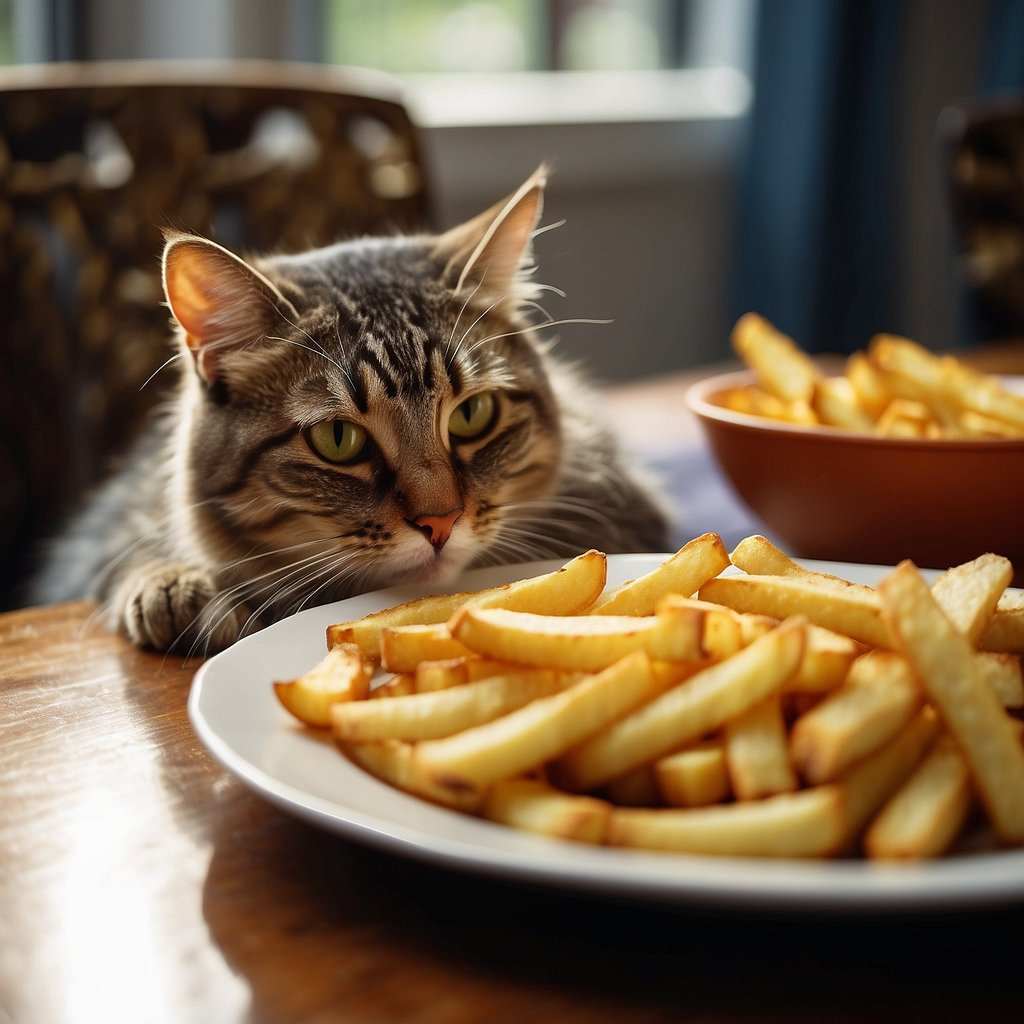
Hey there, cat lovers! Ever caught your kitty eyeing those tantalizing French fries? They may not be the treat your furball needs, but don’t worry—I’ve got your back with some purr-fect alternatives.
Healthy Treat Options for Cats
Let’s snack smart! Cats thrive on a high-protein diet, so here’s a table of vet-approved, protein-rich treats that will have your cat meowing for more:
| Treat Type | Examples |
| Commercial Treats | Freeze-dried meats, fish |
| Homemade Snacks | Baked salmon, scrambled eggs |
| Fresh Foods | Small pieces of cooked chicken |
Introducing New Foods: A Step-by-Step
Change can be a little scary, right? Here’s how to introduce these new snacks to your feline friend:
- Start Small: Offer a tiny amount, and watch for any adverse reactions.
- Mix It Up: Gradually mix new treats with their regular food.
- Stay Consistent: Keep regular meal times and treat times.
Quizzes & Guides: A Bit of Fun
Think you’re a cat nutrition whiz? Why not take an online quiz to test your knowledge? Or get a little creative in the kitchen with step-by-step guides to making healthy homemade cat snacks.
Remember, moderation is key. These alternatives should complement a balanced diet tailored to your cat’s life stage and health needs. And of course, always ensure a bowl of fresh water is at the ready. (7)
By switching to these healthy alternatives, your kitty won’t even miss those fries. Plus, you’ll be championing their well-being with every scrumptious morsel. Now that’s what I call a win-win!
Expert and Medical Advice on Cat Nutrition
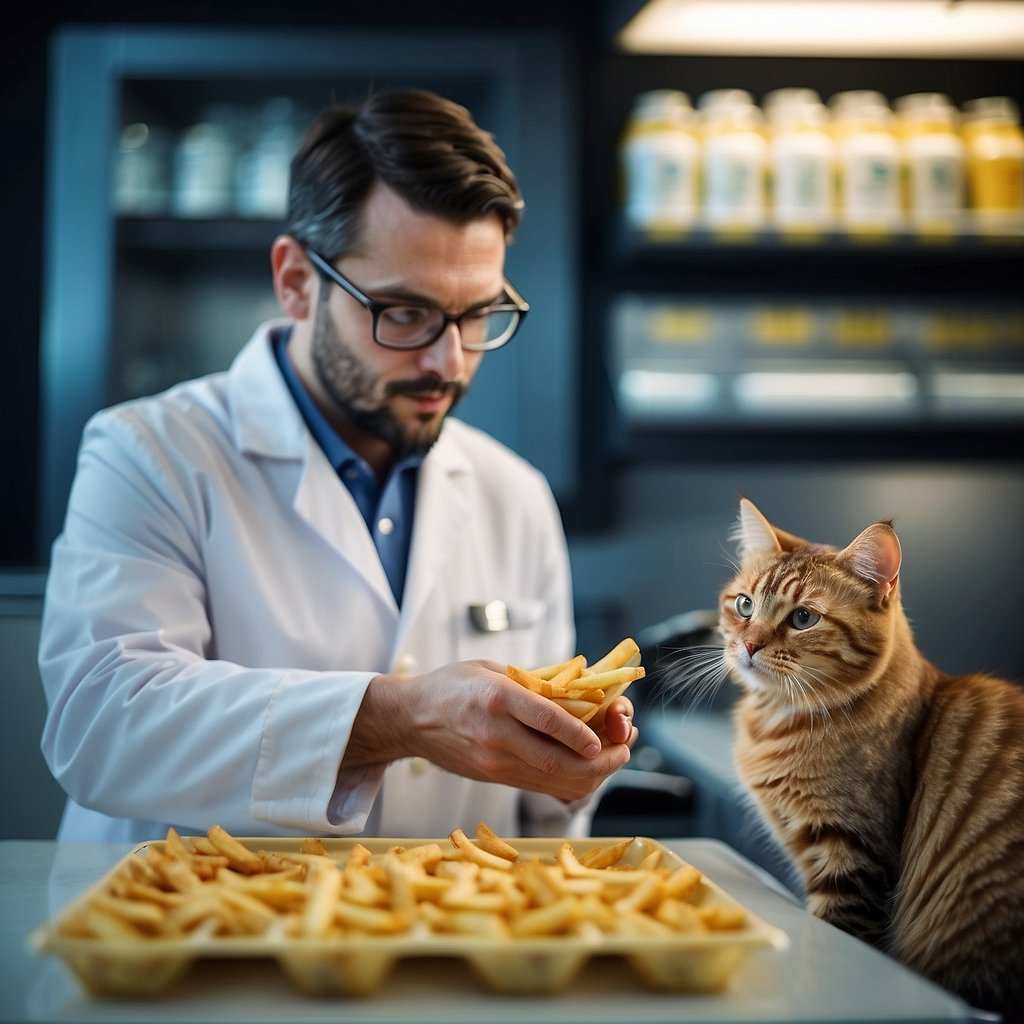
Have you ever wondered if Dr. Whiskers can indulge in the same treats you enjoy? Let’s munch on some expert opinions regarding cat nutrition.
Professional Guidelines and Medical Insights
Veterinarians suggest keeping a close eye on your furry friend for any signs of food intolerance, which may include:
- Vomiting
- Diarrhea
- Excessive itching
If you spot these, it could mean it’s time for a diet adjustment. A balanced commercial diet for your cat usually consists of:
- High proteins
- Essential fats
- Carbohydrates in moderation
Nutritionists point out that these requirements are seldom met by human foods, such as fries, due to high fat and salt content.
Testimonials and Case Studies
Consider Mittens, who sneaked in a pawful of fries and ended up with digestive issues. Here’s what her journey taught us:
- Human foods, including fries, are a no-go for cat health.
- Regular check-ups can spot signs of improper nutrition early on.
Mittens’ misadventure reminds us how crucial it is to stick to vet-approved diets for our whiskered companions.
Remember, it’s all about what’s best for your cat. Curbing those table scraps could save you and your kitty from a purr-ticularly troublesome tummyache! Keep things simple, keep them feline-friendly.
Quick Recap
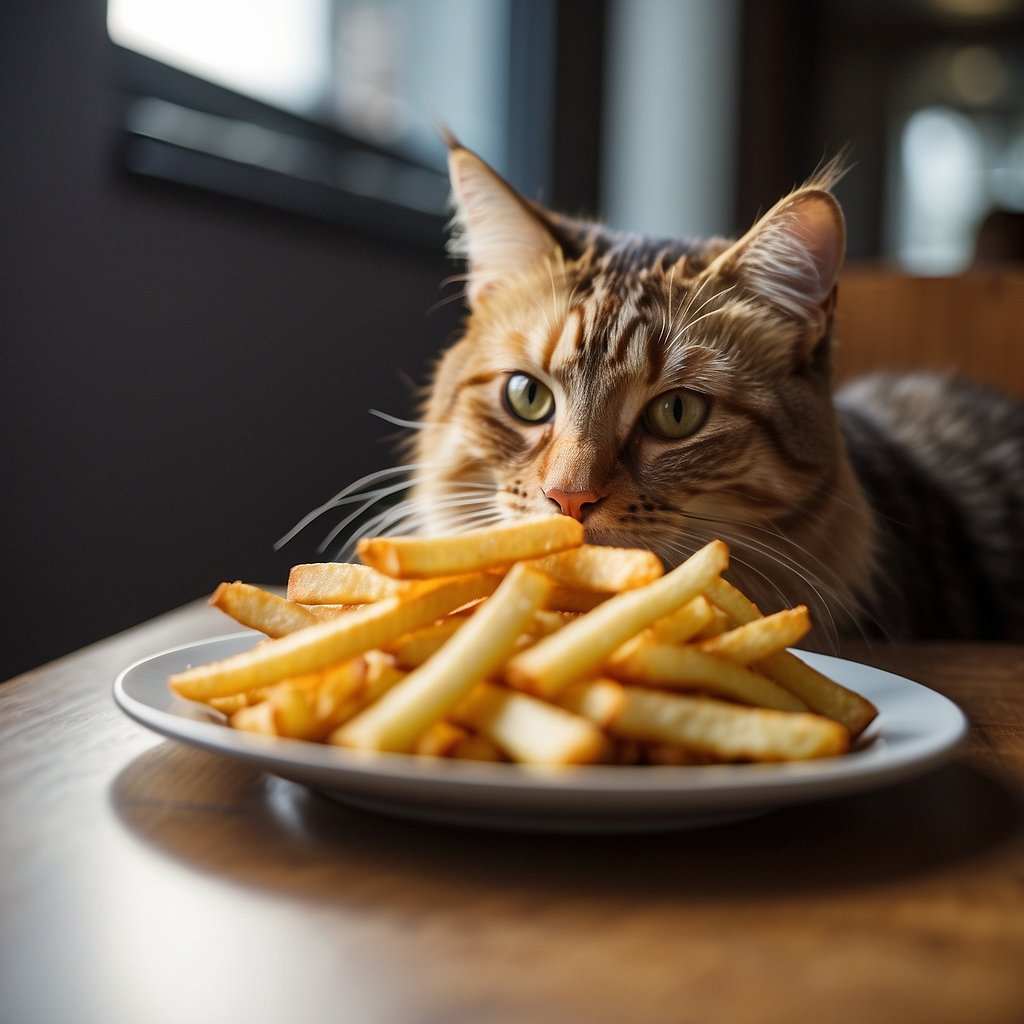
Ever caught your cat eyeing those golden French fries on your plate?
You might wonder if slipping one under the table is okay. While your feline friend might be curious, it’s crucial to stick to what’s best for their health.
Can Cats Eat French Fries?
- Toxicity: Not toxic, but not recommended
- Allergies: Rarely allergenic
- Species Appropriateness: Not suited for cats
Feeding Frequency
- How Often: Never
- How Much: None
French fries aren’t toxic to cats, but here’s the crunch. Fries are typically high in fats, salts, and carbs—none of which are superstar additions to your cat’s diet.
Remember, you’re the guardian of their well-being, and it’s up to you to prevent potential gastrointestinal upsets, weight gain, and avoidable visits to the vet due to their salt and fat content.
Feeding your cat fries is like feeding them empty calories. Those calories can quickly add up to obesity. And think about it—would you eat something that could make you unwell, just because it tastes good?
Not the best idea, right?
Consider this: cats need protein, and fries are potato, oil, and salt—a combination you won’t find in any cat’s natural diet. So before you’re tempted to treat them to a fry, opt for a cat-friendly snack instead.
Your furry friend will thank you with purrs and cuddles, minus the tummy trouble!
Plus, store-bought French fries are typically made using around 20 different ingredients and artificial flavors, but they don’t provide any nutritional value like vitamin C, fiber, or B vitamins that cats need.
Are fries safe for cats?
In a pinch, if they sneak one, it’s not the end of the world, but it’s not a feline-favorite food choice. Look after your kitty’s diet and they’ll be set to prowl and play, not just today, but for all their nine lives!
Frequently Asked Questions
Your cat’s health should always be a top priority. As a cat owner, you might wonder about the nuances of allowing your feline friend to partake in human foods, such as the ever-tempting French fries.
Let’s chew over the common questions that might pop up when your kitty eyes up your plate of fries, including whether it’s safe to offer them a piece of food according to veterinarian research.
Is it safe for my furry friend to nibble on salty French fries?
No, it’s not safe. French fries contain high levels of salt and fat which are not suitable for your cat. These ingredients can lead to dehydration and other health issues.
Are there any nutritional benefits of giving fries to cats?
No, fries have no nutritional benefits for cats. They are high in unhealthy fats, sodium, and can be difficult for cats to digest.
It is best to stick to a balanced diet of cat-friendly foods to ensure their overall health and well-being.
Can cats digest fried food properly?
Cats have a limited ability to digest carbohydrates, and fried foods can be high in fat and salt, which can be harmful to cats.
It is best to avoid feeding cats fries or any other fried food as part of their diet to ensure their overall health and well-being.
Can kittens have fries, even in small amounts?
Kittens are especially sensitive to improper diets. Their little bodies can’t handle the high carbohydrates, salt, and fat in French fries, making them a definite no-no for kittens.
What are the immediate signs that my cat is negatively affected by eating fries?
Look out for symptoms such as vomiting, diarrhea, or lethargy. If you observe any of these after your cat has eaten fries, contact your vet right away.
Should I worry about French fries causing harm to my cat’s health?
Yes, you should be concerned. Over time, the unhealthy ingredients in fries can lead to obesity, high blood pressure, and diabetes in cats.
Can certain cooking methods make fries safer for cats?
Even though cooking methods can vary, there’s no way to make French fries healthy for cats. All the risks associated with the ingredients remain regardless of how they’re cooked.
Can eating fries lead to long-term health issues in cats?
Indeed, a diet consistently including fries can lead to long-term health issues such as obesity, diabetes, and heart disease due to the high fat and sodium content.
- Where to find the most trustworthy real money casinos - August 7, 2025
- Online Casinos That Approve PayPal: The Ultimate Overview - August 7, 2025

